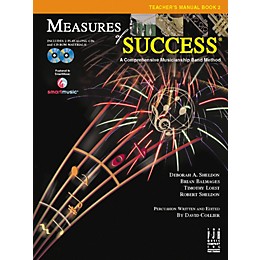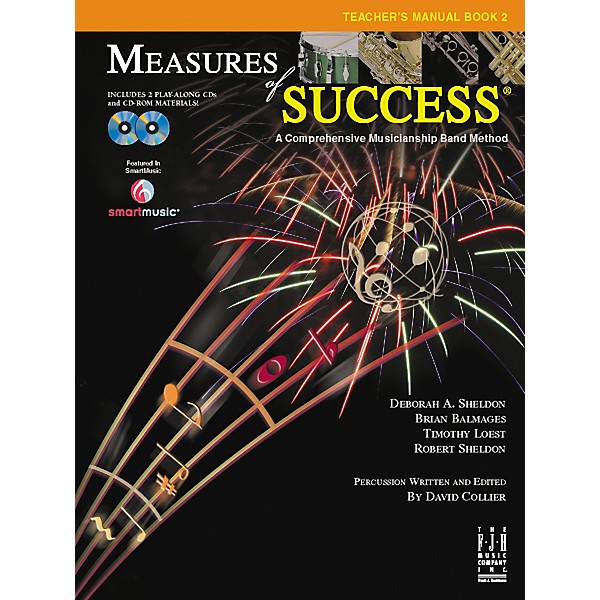Gear SpecialistBundlingMusician
Guitars
Guitars
Amps & Effects
Amps & Effects
Used & Vintage
Keyboards & MIDI
Keyboards & MIDI
Drums
Drums
DJ Equipment
DJ Equipment
Basses
Basses
Recording
Recording
Live Sound
Live Sound
Accessories
Accessories
Mics & Wireless
Mics & Wireless
Music Software
Music Software
Lighting
Lighting
- Popular Brands
Band & Orchestra
Band & Orchestra
Platinum Gear
Deals
New Arrivals
FJH Music Measures of Success Teacher's Manual Book 2
$39.95
6-month special financing^ + $1 back in Rewards** Limited time Learn More
Save on orders $199+ and get expert advice from a Gear Adviser
Need Help?
Description
Measures of Success is divided into six chapters (Opus 1 through 6). Each "Opus" is followed by a full-page assessment. Students are able to attain achievable benchmarks throughout the method, which keeps them motivated, excited, and playing their instruments.
Music history is presented simultaneously with art, literature, and world history, giving students a broad picture of social and artistic events of a certain time period. Composer pictures, artists, paintings, authors, literary works, world history, and fun facts are presented throughout the method. This strongly supports the National Standards and encourages cross-disciplinary study in music education. Best of all, it is contained in the text so directors do not need to do additional research.
Critical Listening
Musical examples are provided on the CDs and students are asked to critique performances, identify musical elements including time signature, tempo, articulation, and more. Each critical listening exercise is correlated with material the student hasjust learned.
Playing By Ear
Easy tunes are introduced on the CDs and students are encouraged to learn them on their own. They can then play along with an accompaniment that is provided.
Composing / Arranging
Progressive lessons move from simple composition into arranging, and students are eventually introduced to improvisation in an easy and fun way.
Theory and Terminology
Written exercises reinforce a multitude of concepts. To establish a solid foundation, students are often required to look through previous chapters in addition to the current Opus.
PLAY-ALONG CDS: A NEW LEVEL OF ACCOMPANIMENT
All exercises are played twice by professional musicians-first with the student line, then the accompaniment alone. Accompaniments include live musicians, incredible orchestrations, and a wide variety of styles including concert band, full orchestra, rock, Latin, jazz, funk, country, electronic, and world music. Classical pieces are presented with accompaniments that put them in their original context. Percussion-specific CDs let percussionists hear a characteristic sound of every Instrument while the winds are moved into the background.
NEW FEATURES IN BOOK 2
Review - a comprehensive Recapitulation chapter that reviews material from Book 1
Sight Reading - correlated with each Opus
Warm-ups - a full page of long tones and choralesfor individual, section, or full band use
Improvisation - five improvisation studies with flexibleperformance options
World music - representing music from 20 countriesacross the globe
Composers - over 35 composers, including 14 newfeatured composers
New cross-curricular opportunities - ties to many literary works included in school curricula
Music history is presented simultaneously with art, literature, and world history, giving students a broad picture of social and artistic events of a certain time period. Composer pictures, artists, paintings, authors, literary works, world history, and fun facts are presented throughout the method. This strongly supports the National Standards and encourages cross-disciplinary study in music education. Best of all, it is contained in the text so directors do not need to do additional research.
Critical Listening
Musical examples are provided on the CDs and students are asked to critique performances, identify musical elements including time signature, tempo, articulation, and more. Each critical listening exercise is correlated with material the student hasjust learned.
Playing By Ear
Easy tunes are introduced on the CDs and students are encouraged to learn them on their own. They can then play along with an accompaniment that is provided.
Composing / Arranging
Progressive lessons move from simple composition into arranging, and students are eventually introduced to improvisation in an easy and fun way.
Theory and Terminology
Written exercises reinforce a multitude of concepts. To establish a solid foundation, students are often required to look through previous chapters in addition to the current Opus.
PLAY-ALONG CDS: A NEW LEVEL OF ACCOMPANIMENT
All exercises are played twice by professional musicians-first with the student line, then the accompaniment alone. Accompaniments include live musicians, incredible orchestrations, and a wide variety of styles including concert band, full orchestra, rock, Latin, jazz, funk, country, electronic, and world music. Classical pieces are presented with accompaniments that put them in their original context. Percussion-specific CDs let percussionists hear a characteristic sound of every Instrument while the winds are moved into the background.
NEW FEATURES IN BOOK 2
Review - a comprehensive Recapitulation chapter that reviews material from Book 1
Sight Reading - correlated with each Opus
Warm-ups - a full page of long tones and choralesfor individual, section, or full band use
Improvisation - five improvisation studies with flexibleperformance options
World music - representing music from 20 countriesacross the globe
Composers - over 35 composers, including 14 newfeatured composers
New cross-curricular opportunities - ties to many literary works included in school curricula

Reviews
Be the first to review the Product
Q&A
Have a question about this product? Our expert Gear Advisers have the answers.
No results but…
You can be the first to ask a new question.
It may be Answered within 48 hours.

.jpeg)

